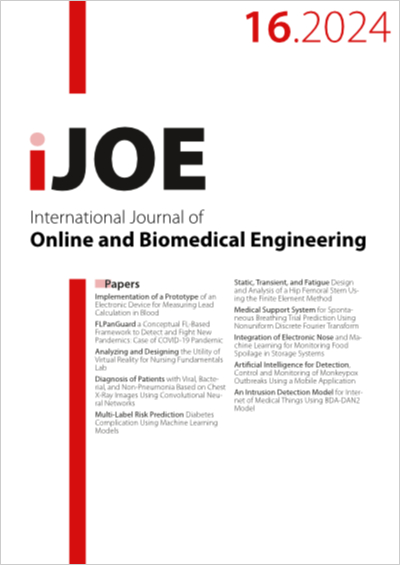Integration of Electronic Nose and Machine Learning for Monitoring Food Spoilage in Storage Systems
DOI:
https://doi.org/10.3991/ijoe.v20i16.52911Keywords:
Electronic nose, machine learning, potato spoilage, volatile organic compounds, post-harvest loss, gas analysis systemAbstract
The integration of sensor technology and artificial intelligence (AI) is transforming agriculture, particularly in post-harvest management. This study focuses on utilizing an electronic nose (e-nose) system in conjunction with machine learning (ML) models to monitor and detect potato spoilage in storage environments. The e-nose system, equipped with sensitive gas sensors, detects volatile organic compounds (VOCs) emitted by potatoes during different spoilage stages. By analyzing these emissions, the system can identify early signs of spoilage, offering a valuable solution for mitigating post-harvest losses, which remain a significant challenge in the agricultural sector. Through a series of controlled experiments, VOCs were captured and analyzed using a neural network model, classifying the potatoes into three categories: fresh, mildly spoiled, and fully spoiled. The neural network was trained on data from multisensory gas analysis, achieving a high level of classification accuracy. This study demonstrates that the integration of e-nose technology and ML algorithms can effectively monitor potato quality in storage, providing real-time insights to optimize storage conditions, extend shelf life, and reduce wastage.
Downloads
Published
How to Cite
Issue
Section
License
Copyright (c) 2024 Shakhmaran Seilov, Dias Abildinov, Marat Baydeldinov, Akniyet Nurzhaubayev, Bibinur Zhursinbek, Gabriel Xiao-Guang Yue

This work is licensed under a Creative Commons Attribution 4.0 International License.



